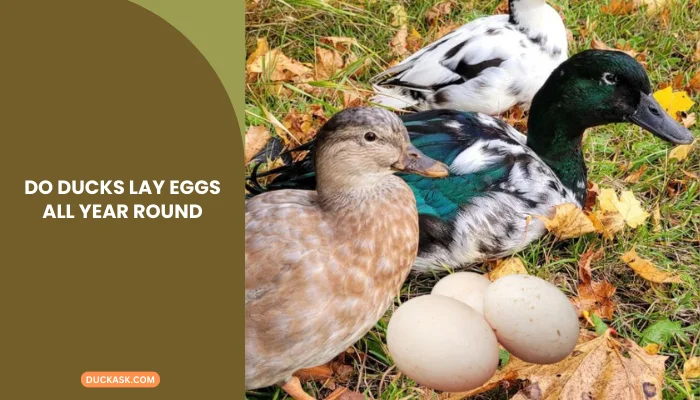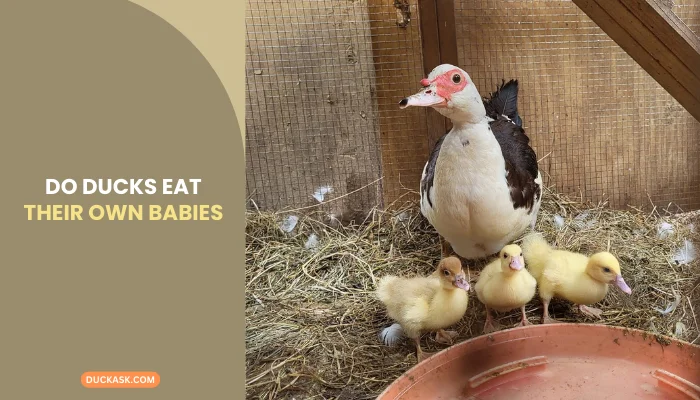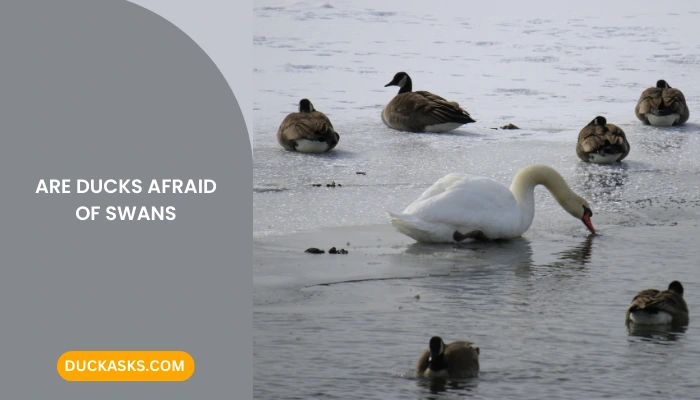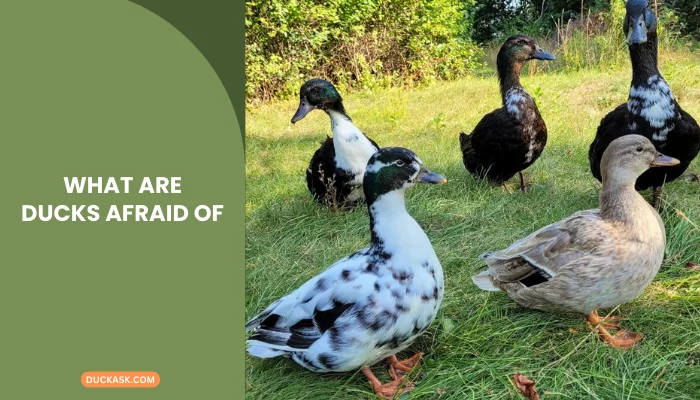What Sound Do Ducks Make?
Though ducks don’t have a large variation of sounds, there are a few different noises that they make to communicate with each other. These sounds are distinctive features of ducks that make them different from other waterfowls.
So, if you know what sound do ducks make, it becomes easier to identify them. Ducks’ quack is the most familiar sound that they make, whether for communicating or expressing certain emotions. But besides this particular one, they also make several vocal and non-vocal sounds in specific circumstances.
In this article, we have represented a brief discussion of different duck sounds. And you will also find out how to identify them based on the sounds they make.
Looking for more articles about duck habits:
What Is the Typical Sound that Ducks Make?
The most common and typical sound of ducks is quack, by which you can easily identify that they are somewhere near you. Though it seems that every duck makes the quack sound, actually, only the female mallards make this sound particularly.
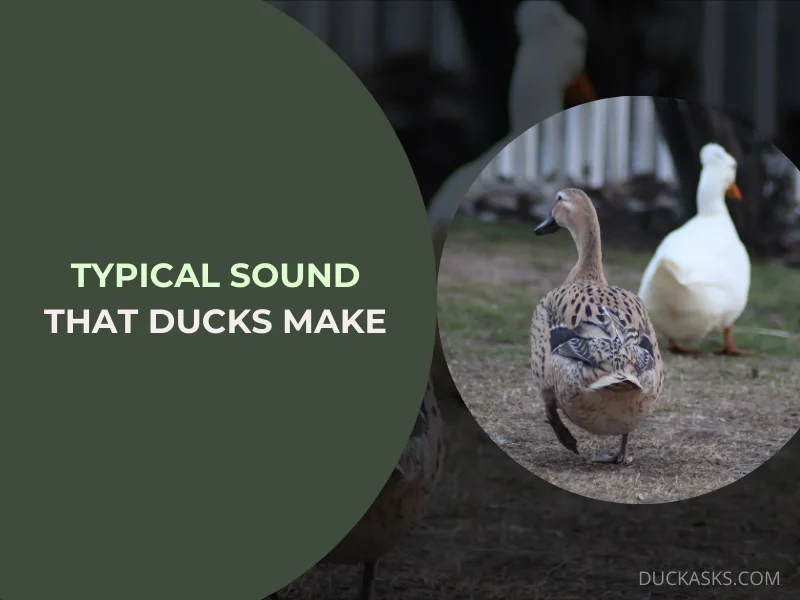
Female mallards start a series of quacks that is louder at the beginning, but as it ends, the sound gets softer. Generally, they make paired quacks and mostly give five pairs of quacks in a single series.
The male ducks are not seen quacking like the female ones. Instead, they typically make a softer and quieter sound that lasts for a short period.
This sound is generally a combination of single or double notes that may change according to their certain emotions.
What Other Noises/Sounds Do Ducks Make Besides Quacking?
There are a few varieties of duck noises/sounds besides quacking, and these include lower and higher-pitched tones as a representation of their emotions and moods. Generally, there are two categories of duck noises that we usually hear when they are around.
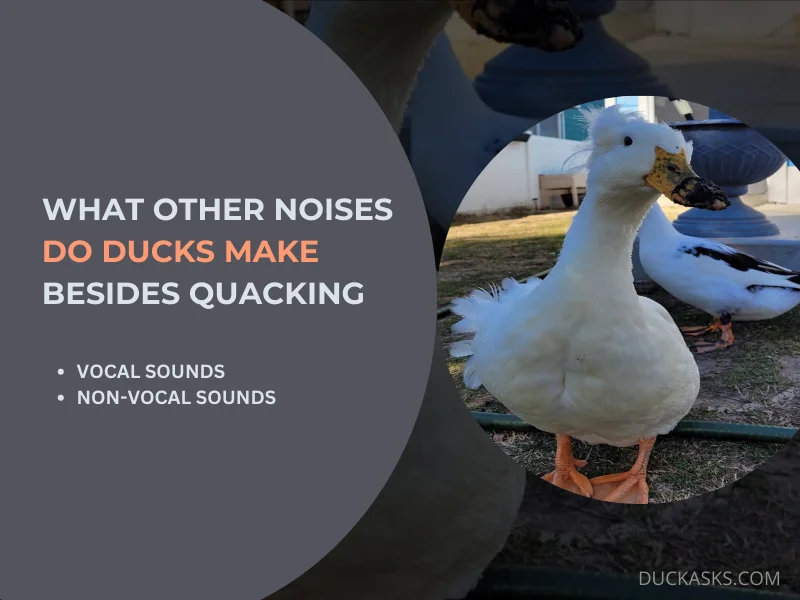
Vocal Sounds
The vocal sounds of ducks are quite similar for every duck and often, they are combinations of similar tones. But these sounds vary depending on their age and gender, carrying variations in the rhythm, pitch and repetition of the sounds.
We have here listed the most commonly heard vocal sounds of ducks that can help you to identify them if they are nearby.
- Whistles
- Purrs
- Honks
- Chatters
- Hisses
- Sighs
- Coos
- Groans
- Grunts
- Squeaks
Non-Vocal Sounds
Often ducks make several noises without using their vocals and these noises mostly depend on the variation of their behavior and activities, including walking, searching for food, running, swimming and gliding.
These following non-vocal noises are commonly heard in duck flocks that indicate certain behaviors of them and provide the most accurate identification.
- While searching for food and walking on land, they make cracking and rustling noises of dry leaves and grass.
- A soft water splashing noise is heard when the ducks are floating and swimming peacefully on the water.
- They make sudden and loud water splashing sounds while jumping in or vertical take-offs from water.
- A prolonged splashing sound when the ducks are gliding slowly on the water surface.
- Some kinds of whistling and thumping noises with their wings while taking small and large flights.
Are Ducks Capable of Mimicking Other Sounds?
Generally, ducks don’t have the nature of learning and mimicking particular sounds.
But researchers have recently made a surprising discovery and found a unique species of duck that can imitate particular sounds besides their regular vocals.
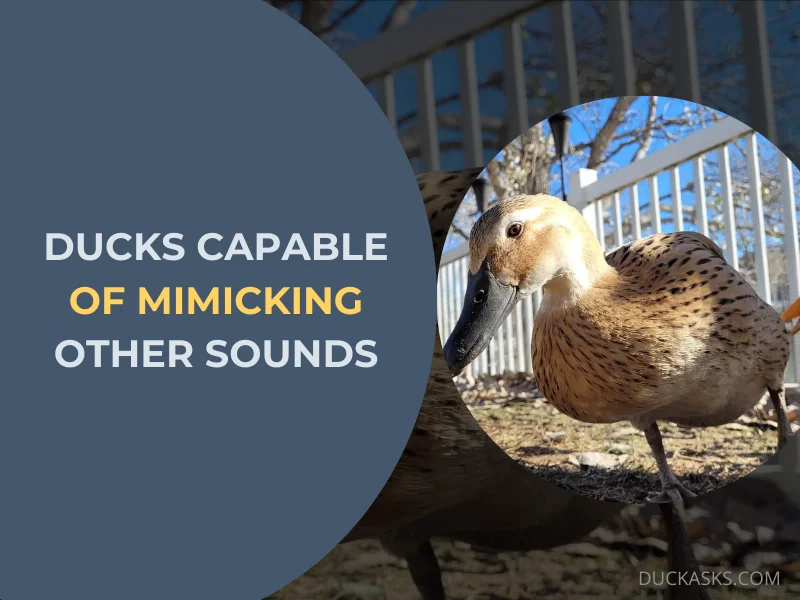
This species of duck, known as Australian Musk Ducks, are domesticated and raised in captivity. They can learn human speech and some other sounds like the noise of coughing, snorting and slamming a door.
But not every domestic Musk Duck can mimic other sounds. Most of the female Musk Ducks are reported not being able to imitate human speech and other non-native noises.
Conclusion
Ducks can make different sounds to exchange information among themselves and display their emotions and behavior.
Though they make distinctive sounds like quacks and honks, often, some of their sounds might seem similar to other birds around us.
Hopefully, this article helped you to know what sound do ducks make that keeps them aside from other birds. Once you make yourself familiar with their sounds, you can easily identify them even when other varieties of birds are around.
Image Credit:
- Facebook.com/ducks_of_providence

